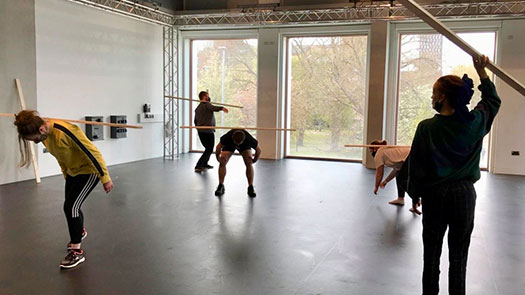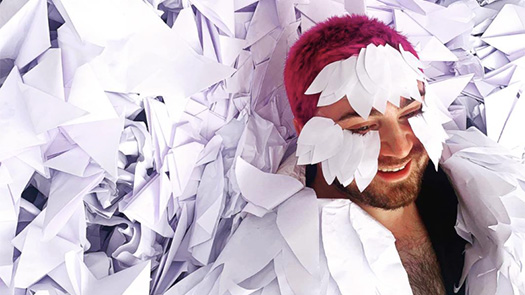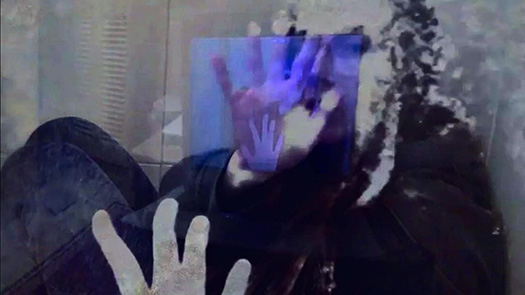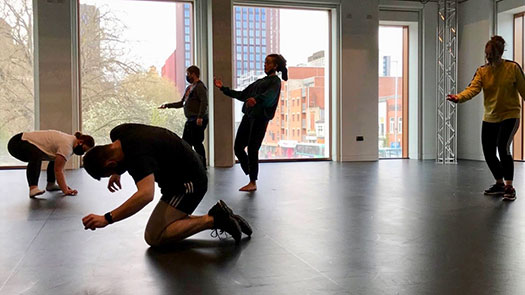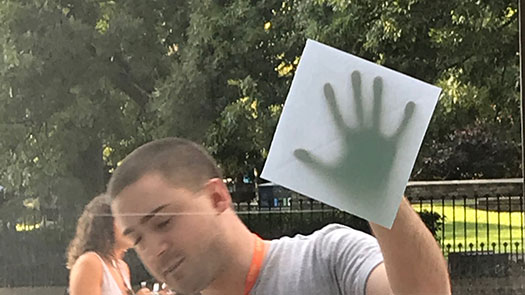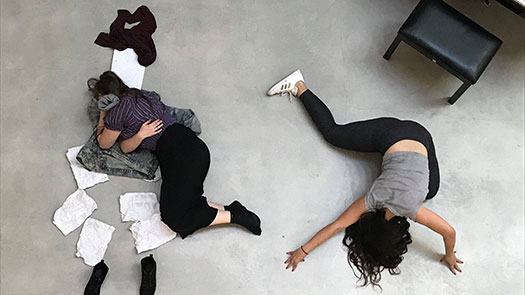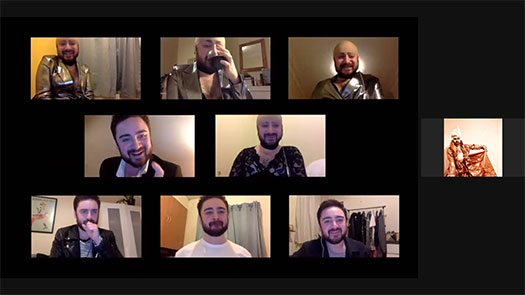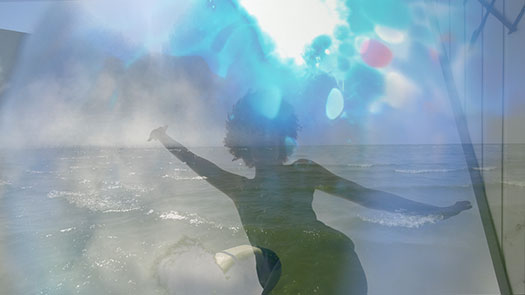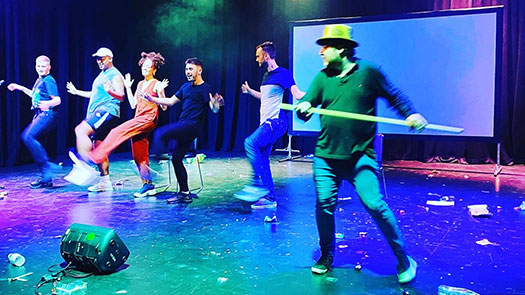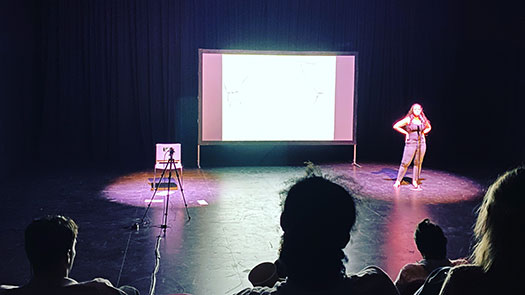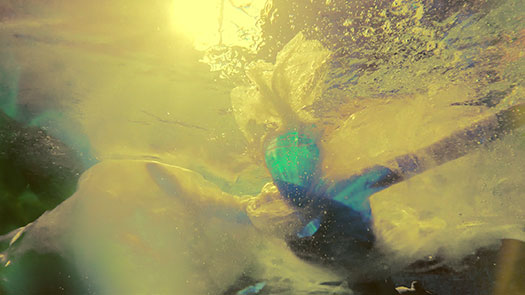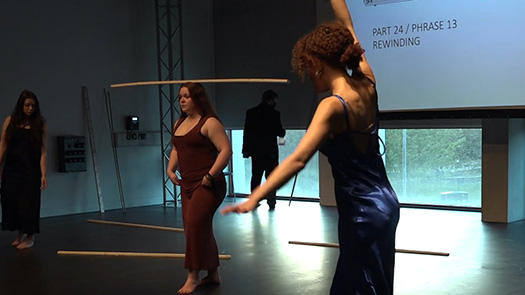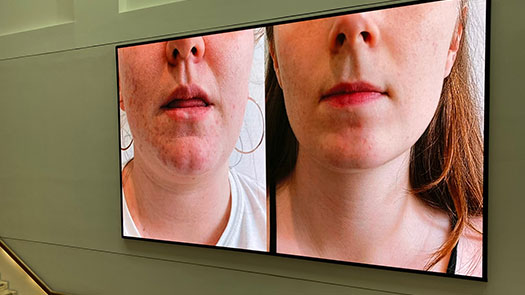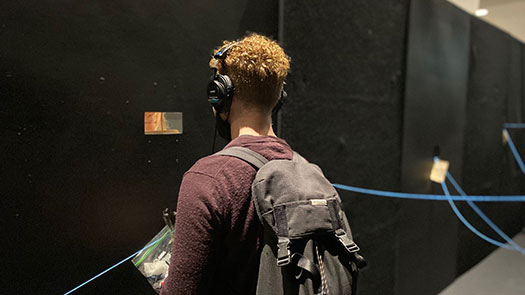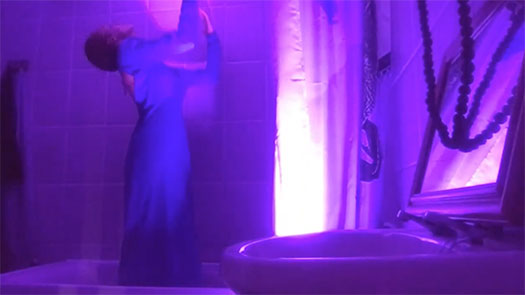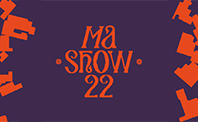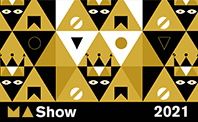Performance
Performance
MFA – 2 years (full-time)
MA/MFA Performance is an exciting taught masters programme that offers a practical, versatile and interdisciplinary approach to performance-making and training. The programme provides you with an advanced and practical understanding of current performance practices, drawing on a broad range of artistic and theoretical influences. The development of new creative practice is at the core of the programme, as well as how this work might be developed and profiled in a professional context.
Furthermore, MA/MFA Performance offers you the chance to specialise in either of the distinctive areas of laboratory theatre or contemporary performance. The experience of these options is fed through a further process of critical and professional contextualisation, before you embark on the creation of your own major project as the culmination of the degree.
The Laboratory Theatre specialism focuses on performer training, dramaturgy and socially-engaged cultural actions. The Contemporary Performance specialism focuses on the creation of innovative and experimental performance practice, within or across the categories of radical theatre, contemporary dance and performance art/live art.
The programme draws particularly on the acclaimed interdisciplinary ethos and context of the Manchester School of Art and Manchester’s international arts networks.
Special Features
- —MA/MFA Performance capitalises on the cultural effervescence of Manchester and the North West region, whilst maintaining an outward-looking ethos, offering students the ability to develop an artistic voice.
- —Our location in the landmark new Grosvenor East building provides the programme with access to significant resources and the potential for cross-disciplinary influence and impact from a wide range of related arts and humanities practices in the faculty.
- —The degree is taught by practitioner-researchers at the forefront of the performance field, with specialist knowledge in contemporary performance and laboratory theatre.
- —The programme prepares students to make radical theatre and performance that responds to the unique challenges of the 21st century.
Course Content
MA/MFA Performance creates a space for asking big daring questions about why we perform, who we perform for and how radical performance can act upon, and in, the world. It offers a distinctive opportunity for graduates and artists, from experimental and laboratory theatre practices, contemporary dance, and performance art backgrounds, to create innovative new performance that plays across artistic borders.
The course is shaped and driven by the passions and expertise of an interdisciplinary team of internationally recognised theatre makers, artists and writers, offering two specialist routes in either Contemporary Performance or Laboratory Theatre.
For graduates this MA/MFA creates a bridge between undergraduate study and the professional arts world. For emerging and mid-career artists this programme is an opportunity for interrogating and transforming your existing work, within a supportive community of like-minded makers, with input from expert practitioners and scholars as mentors. We welcome applications from small groups of collaborating artists as well as individual makers.
Students on the Laboratory Theatre specialism will engage in rigorous psychophysical and vocal training from a range of international lineages and will be introduced to innovative dramaturgical strategies in order to develop their own expanded laboratory practice.
The Contemporary Performance specialism promotes the development of innovative and experimental contemporary performance practice drawing on the lineage of post-modern performance and post-dramatic theatre. Students will create a range of performance projects, with their peers and professional artists, that will expose them to alternative ways of making and thinking about performance in order to intersect with, antagonise, disrupt and compliment their own practice.
The programme leader for MA Performance is Kevin Egan.
Year 1 (MA Full-Time)
MA Units
Progression onto the MFA requires that all 180 credits of the MA are passed, with at least a mark of 50% in each unit.
Major Project
In this module you pursue artistic and theoretical research questions through the generation of a significant new piece of contemporary performance practice. The work is developed through close collaboration with your staff mentor and involve several points of sharing with the wider staff and student team. You will produce an appropriate professional trajectory for the project, identifying appropriate strategies for public engagement and meeting the strategic priorities of relevant funding bodies and/or support structures and networks. This work is shown in a key performance event produced by the student body.
Performance in Context 1
Performance in Context 1 introduces you to the artistic and theoretical contexts in which current contemporary performance practice operates. Working closely with the MA’s practice-based modules, it explores key critical and theoretical perspectives, such as phenomenology, interculturalism, digital humanities and performance politics, that inform innovative contemporary performance.
Performance in Context 2
This module continues to explore the current field of contemporary performance, building upon the work developed in Performance in Context 1. Here the focus shifts to inviting creative interplay between theoretical and artistic practice, as you are supported in the artistic and theoretical contextualisation of your own practice.
The Contemporary Laboratory
This module will involve workshops and making processes that examine what a performative practice might consist of for artists making their own work. Students will begin by participating in an intensive 2-week placement, choosing to focus on either a Contemporary Performance or Laboratory Theatre project delivered by professional artists. These placement projects will initiate a further process of reflexive student-led practice and sharing, culminating in a performance presentation or work demonstration that outlines their developed position on training and/or making. Working against conventional models of performance practice, the module explores training and making as a contemporary laboratory, where forms of devotion, endurance, dialogue and life-style can become strategies for continuous re-orientation.
Performer as Maker
Performer as Maker explores key contemporary performance strategies, drawn from radical theatre and dance practice, that focus on the body as an innovative source for developing material. The teaching delivery takes the form of a series of weekly workshops, which focus on ideas such as authenticity, presence, autoethnography and identity.
Professional Practices
This module reflects on the professional contexts that exist for contemporary performance, and engages with key strategies for self-producing and profiling performance work. Within the module you select, directly engage with, and then reflect upon, a specific professional performance context, placing it into the broader contexts that exist, for example state support for the arts, arts marketing, ethics, local and regional arts provision, artist networks, and international frameworks.
Option Units (Subject to Change)
Making Performance
Making performance explores current contemporary devising strategies in order to facilitate the generation of new and innovative live performance. The module focuses on ideas and practices drawn from current contemporary work in the field, including digital practices, scoring, economy, duration and repetition.
Psychophysical Training
Psychophysical Training is an intensive practice-based module allowing students to interrogate strategies and principles underpinning physical and vocal training for the actor. A range of different laboratory theatre traditions will be explored, with an emphasis on the pre-expressive principles of Theatre Anthropology and the extended vocal practice of the Roy Hart Theatre.
Year 2 (MFA Full-Time)
MFA units
For students to graduate with the MFA in a bracketed specialism, they will need to carry their specialism into the MFA, for example, in the Production unit, students focusing on Laboratory Theatre will come out with MFA Performance (Laboratory Theatre).
Production
This module offers students the opportunity to develop a major practice-based project that is specifically designed to operate within the professional context identified in the MFA Production Contexts module. Students create and self-produce an innovative piece of work, or platform, exhibition or exchange event, that promotes and sustains their work. They might choose to work individually or in collaborative groups and are supported in the development of the work by a staff mentor.
Production Contexts
In this module you will identify new professional contexts for your work that will enable you to sustain your professional practice. The module has a particular emphasis on the potential for European and international networks, as well as interdisciplinary fine/digital art contexts, to support innovative contemporary performance practice. Here you will articulate, develop and actualize contemporary self-production strategies, such as setting up an artist’s network, exchange project or creative platform for your work. The module will be assessed by portfolio submission, which can include a range of materials including project proposals, feasibility studies, and promotional material.
Staff
- Kevin Egan
Programme Leader
— - Patrick Campbell
Senior Lecturer
— - John Deeney
Senior Lecturer
— - Shane Kinghorn
Senior Lecturer
— - Andrea Maciel Rodrigues
Lecturer
— - Neil Mackenzie
Senior Lecturer
— - Michael Pinchbeck
Professor of Theatre
— - Rachel Rimmer-Piekarczyk
Senior Lecturer
—
Student Profiles
Visit our digital showcase sites to view profiles of some of our recent graduates.
Graduates
MA/MFA Performance graduates will leave the programme able to operate as performance practitioners at a professional level, whilst understanding the vocational and critical contexts in which the field operates. This will empower them to develop a career as freelance theatre artists, or as other professionals in the sector (producers, programmers, facilitators, curators, pedagogues etc.) or to combine these identities based on their own interests/skill-sets, as is increasingly common practice in the portfolio careers built by performance artists.
Making an Application
Entry Requirements
Normally applicants will have a good undergraduate UK honours degree (minimum 2:2) in a related subject (or international equivalent), or a degree-equivalent postgraduate diploma, or a professional qualification, or relevant professional practice.
IELTS overall requirement 6.5 with no less than 5.5. in any category.
Progression onto the MFA requires that all 180 credits of the MA are passed, with at least a mark of 50% in each unit.
Interview may be required.
How to Apply
Please apply online using the link below.
Tuition Fees 2025 Entry
UK and Channel Island students
Full-time fee: MA £12,000. MFA £20,000 (Year 1 £12,000, Year 2 £8,000). Tuition fees will be as stated for each year of your course providing you complete it in the normal timeframe (eg no repeat years or breaks in study).
Part-time fee: £2000 per 30 credits studied. The fee per credit will remain the same for each year of your course providing you complete it in the normal timeframe (eg no repeat years or breaks in study). The total fee for the part-time course is the same as the full-time course but the amount you pay each year may differ based on the number of credits studied.
EU and non-EU international students
Full-time fee: MA £22,002. MFA £36,670 (Year 1 £22,002, Year 2 £14,668). Tuition fees will be as stated for each year of your course providing you complete it in the normal timeframe (eg no repeat years or breaks in study).
Part-time fee: £3667 per 30 credits studied. The fee per credit will remain the same for each year of your course providing you complete it in the normal timeframe (eg no repeat years or breaks in study). The total fee for the part-time course is the same as the full-time course but the amount you pay each year may differ based on the number of credits studied.
Additional information
A masters qualification typically comprises 180 credits, a PGDip 120 credits, a PGCert 60 credits, and an MFA 300 credits.
Eligible alumni receive a 20% discount on their postgraduate tuition fees. Find out more about our Alumni Loyalty Discount.
Additional Costs
Specialist Costs
£100* plus optional £500* —Students may incur production costs, up to £500, depending entirely on their own creative decisions/individual practice, particularly within the Major Project unit.
Students will also be expected to attend a number of live performance events to support their studies during the programme, costing a maximum of £100 in total.
Trips and Placement Costs
* All amounts shown are estimates.
